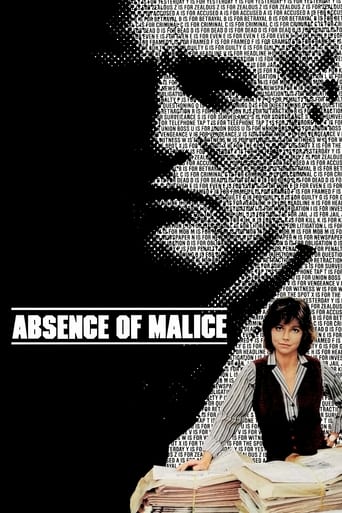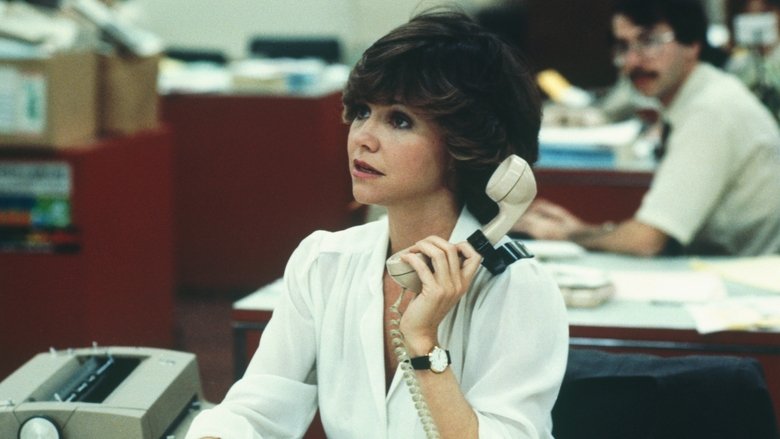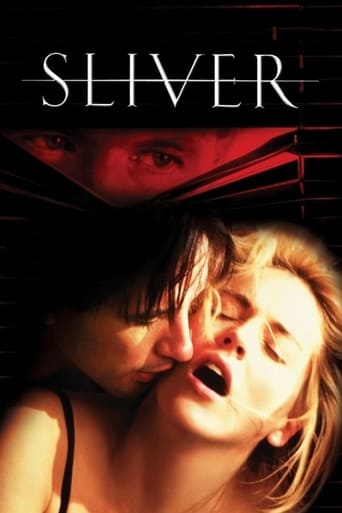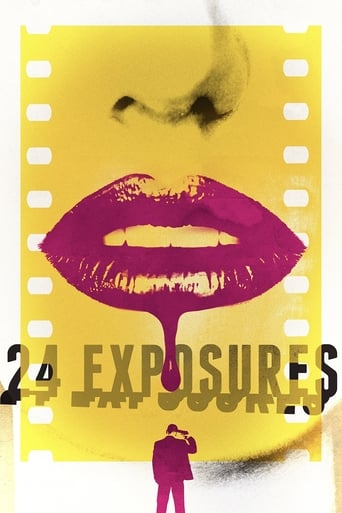Absence of Malice (1981)
Megan Carter is a reporter duped into running an untrue story on Michael Gallagher, a suspected racketeer. He has an alibi for the time his crime was allegedly committed—but it involves an innocent party. When he tells Carter the truth and the newspaper runs it, tragedy follows, forcing Carter to face up to the responsibilities of her job when she is confronted by Gallagher.
Watch Trailer
Cast


Similar titles
Reviews
Simply Perfect
If the ambition is to provide two hours of instantly forgettable, popcorn-munching escapism, it succeeds.
The movie's neither hopeful in contrived ways, nor hopeless in different contrived ways. Somehow it manages to be wonderful
The film's masterful storytelling did its job. The message was clear. No need to overdo.
That is not the best of all films about crime in Miami: we are still a long way from Dexter. There is no real suspense since the person who disappeared six months earlier is not found and the person responsible for his disappearance is not identified either. In fact we have a completely different film than a real criminal investigation.Some police force, or rather one person, a prosecutor, using that police force decides to target a man who apparently has nothing to do with any real crime, just because his father was a mafia bootlegger, so out of spite and with the intend to . . . and that's just the point: reveal a criminal? But Mr. policeman is acting on a hunch, not real evidence and then later on even without the necessary warrant to tap the phones of the concerned person. So he leaks a file in the first part of this investigation, and then his direct subordinate leaks the file in the second part of the investigation that has actually become totally illegal after the DA had declared it closedIn that net a 34 year old journalist finds herself trapped between hurting people and promoting her career, under the guidance of an editor who will get her off the case when the department of justice gets his big nose in the imbroglio. She hurts a lot of people actually. She even causes the suicide of one person. And that person had told her clearly enough that she couldn't take the publicity of her abortion. But she quoted her name nevertheless. The man who is targeted just plays back and settles his own accounts with the DA and the police force that is concerned here. He manages to ruin the reputation of the DA and to ruin the career of the cop. And then he sells his house, and business I guess, and sails to the North East, leaving the girl behind and with no promise that he would answer if she wrote and no request on her part for him to write.The acting is OK but the plot is slightly easy and the absence of malice is definitely not true of the cop who wants to hurt the man, Michael Gallagher by the way, out of pure vanity; nor of Gallagher once he decides to settle these accounts. The only one who has no intent to hurt anyone is the poor journalist but she is absolutely naïve and unconscious since she causes one suicide. Irresponsible, it is called in my book of ethics.Dr Jacques COULARDEAU
Sydney Pollock directed this interesting drama starring Paul Newman as Miami Liquor salesman Mike Gallagher, who is the son of a mobster, though Mike himself is unconnected. When a Union Head is murdered, and mob involvement suspected, an overambitious Federal Attorney(played by Bob Balaban) decides to pressure Mike into helping them(even knowing his innocence) by going to irresponsible reporter Megan Carter(played by Sally Field) to publish the story. Mike has a solid alibi for the murder, but won't reveal it because it would hurt his fragile friend Teresa(played by Melinda Dillon) When the story(and her involvement) is published, it leads to tragic consequences, and Mike decides to teach the reporter and FBI a lesson by beating them at their own game...Well acted and made drama makes good points about the media and personal responsibility. Almost goes wrong with misguided romance of Mike and Megan, but rights itself with memorable finale, with Wilford Brimley stealing the film in a fantastic supporting performance, laying down the law in amusing yet intelligent fashion.
Films about journalists have the ability to be hard-hitting, intense and topical stories that pack a mean punch. Look no further than All The President's Men for one of the finest examples of that, or more recently Rod Lurie's grossly overlooked Nothing But The Truth. However, when you take away that hard punch, you take away the soul of a journalism movie and the result ends up being quite flat. Absence of Malice is an example of the latter, a film that does a lot of things right but lacks a real flare for journalistic integrity.The story is vaguely interesting at times, but it never sizzles the way that it should and focuses too much on a half-assed and frankly uncomfortable relationship drama subplot. The main character is probably the most unprofessional reporter I've ever seen on film (honestly, people in that line of work should be offended) but looking past that, she's portrayed by Sally Field in one of the grossest examples of miscasting imaginable.This is a character who is supposed to be hotheaded, stubborn, all about the story and very, very stern, but Field isn't capable of playing any of those things, at least not at this point in her career. With her soft appearance and almost whisper of a voice, Field looks like a soccer mom trying to play reporter and it's kind of embarrassing how beneath the rest of the ensemble she is. There's strong supporting work by Melinda Dillon, Bob Balaban and Wilford Brimley, who only appears in one scene and completely dominates it, but it's no surprise that the star of the show is Paul Newman.Newman plays a member of a family with a criminal background who is slandered by Field's newspaper, and he portrays this with a kind of calm frustration that is fascinating to watch. This is an extremely intelligent man who knows all the roles that people are playing, but keeps all of this close to his chest and puts on the facade of the everyday man in the flannel shirt and blue jeans. It's primarily an internal work, with his world-worn face contrasted by the everlasting spark of those piercing blue eyes, but there are a few moments where he lets all of his rage out on the surface and delivers a shattering force of a performance.The movie is never hard to watch and moves along quite briskly, but ultimately it's a case of what it should have been rather than what it is. A journalist with no bite isn't going to leave much of an impression, and the same can be said about a journalism film. A disappointment coming from Sydney Pollack, who has delivered plenty of films with a lot more punch than this one, so you know he was capable of doing it proper. The title of the film is Absence of Malice, which is a slight irony since the product itself is lacking in any kind of strong emotion.
It's not a bad movie, not insulting to the intelligence or pandering to the glands, and it deals with matters of some ethical importance, but, man, it's murky stuff.Sally Field, cute and pixyish as ever, is a newspaper reporter in Miami. She's not particularly ambitious but she's responsible and feels that the public has the right to know whatever she herself knows.An unscrupulous local law-enforcement officer, Bob Balaban, decides to harass Paul Newman, bootlegger's son but innocent of any wrongdoing, in connection with the disappearance of a union organizer. In an interview with Field, Balaban leaves a folder containing the case against Newman conspicuously on his desk, then tells Fields he's going away and she should make herself at home. It's an invitation to read some documents that the law forbids him to reveal.Complications ensue. There is a death that results from Field's honest but ruthless reporting. And things gets really confusing -- I HOPE -- because somewhere along the line I found myself leaping around blindly in all directions trying to follow the plot.The jactitations reminded me of something else -- all my home theater equipment. See, the units themselves -- the DVD and tape players, the amplifier -- they're all black. So are the buttons. And so is much of the tiny printing. In the subdued lighting of the vast living room here in the trailer I call home, you can't see or read the buttons or the print. You know why? I'll tell you why. Because the whole Geschaft was designed by a bunch of moss-covered technicians in a brightly lighted room with all the equipment on eye-level shelves. They can read all the details of the black print on the black face plate and interpret all of the complicated carbuncles on the rear. Fine in a laboratory, a headache at home.I had the same feeling about this plot, with all its criss-crossing motives and correlated conundrums. The writers and the director -- Sidney Pollack, whose work I admire -- and the script doctors must have gone over the story multiple times until they had all the rip currents memorized. Then they plunged ahead with a story that makes Raymond Chandler look like a model of expositional clarity.And frankly Paul Newman, another whose work elsewhere I've admired, is no help. When he doesn't sink his teeth into a role, nothing much comes of his performance, and with the exception of one scene that's the case here. Sally Field is okay, cute thing that she is. The best performance, perhaps, is Melinda Dillon's as the pathetic, weak school principal. At least she gets to go crazy, running from lawn to lawn in her nightgown, trying to pick up every newspaper on every front yard in the city of Miami. Next best performance: Bob Balaban as the unflappable slime ball who starts the whole tale.It's too bad so much was lost. Journalistic ethics have become more important an issue now than they were when this film was released -- a few years after the wildly successful "All The President's Men." Newspapers have the time and resources for in-depth reportage, in a way that even 24/7 cable news channels do not. They maintain permanent bureaus in places like Madrid, even when nothing is going on. They have facilities to investigate more than sexual peccadilloes. Lamentably, the way things are going we will be left with two newspapers, The New York Times and The Wall Street Journal. And after that? Sixty-second sound bites to be played over and over, and hour-long opinion journalists telling us what think the sound bites meant.


















